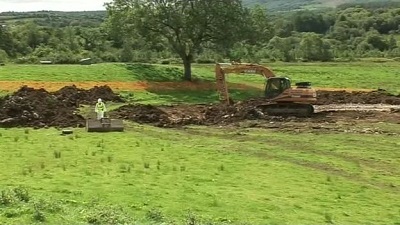
Environmentalists fear Northern Ireland could be left behind when it comes to protecting important species and habitats after Brexit.
Much of the current protection is based on EU law, backed up by the threat of fines from a European court.
But after Brexit, that oversight will be lost.
And with no Northern Ireland Assembly to legislate on replacing it, experts claim governance gaps could open up.
EU directives are given legal effect by domestic legislation, which will continue to apply.
Civil servants have taken an option to extend some English laws to Northern Ireland and say existing protections will not be undermined.
But environmentalists’ concerns remain, especially when it comes to cross-border EU protected sites and issues like water and air quality.
Nature Matters NI is an umbrella for groups like the National Trust, RSPB and Ulster Wildlife which have come together to campaign for a green Brexit.
Spokesperson Emily Hunter said there was already “weak” environmental governance in Northern Ireland.
“We’re the only part of the UK that doesn’t have an independent environmental protection agency but we don’t have a government to put anything in place to replace what we’re losing from the EU,” she said.
“So we’re in a position where we could easily fall behind the rest of the UK.”
Slieve Beagh is a huge area of upland blanket bog straddling counties Monaghan, Ty Dr Viviane Gravey lectures in European politics in Queen’s University and specialises in agriculture and environmental policy.
She cites cross-border dumping of waste as an example of how UK and Irish membership of the EU worked.
It helped in the repatriation of large quantities of domestic rubbish from illegal landfills in Northern Ireland back to the Republic of Ireland, where it came from.
“There was a mechanism there to deal with that and ensure that Ireland would pay most of the cost of repatriating that waste,” she said.
An important EU protected habitat in its own right, it is also a stronghold for the hen harrier, a scarce bird of prey.
At present, it is covered by an EU-funded conservation project.
Ecologist Rory Sheehan helps manage it. He said there was great commitment to the area and its wildlife and, with EU directives transposed into domestic legislation on both sides of the border, he is confident protection that will not be diluted.
But he is concerned about funding and whether colleagues in Northern Ireland will continue to be able to draw down EU Peace money in future.
The signs are positive, but the details are still to be worked out.
Dr Viviane Gravey lectures in European politics in Queen’s University and specialises in agriculture and environmental policy.
She cites cross-border dumping of waste as an example of how UK and Irish membership of the EU worked. –BBC





